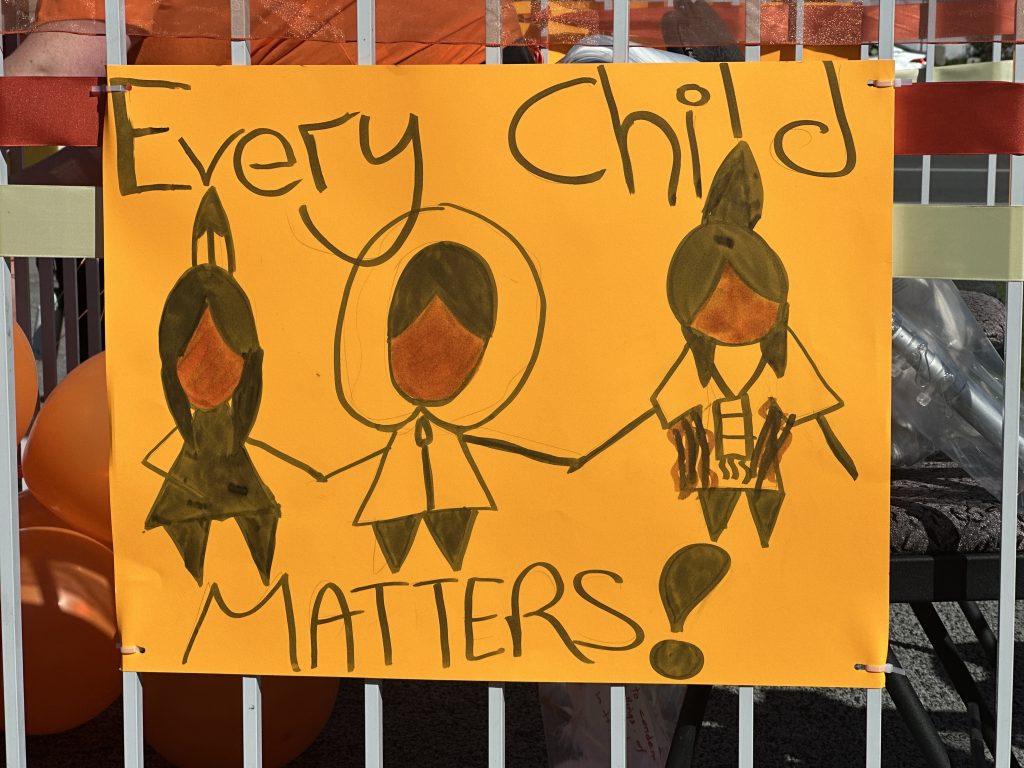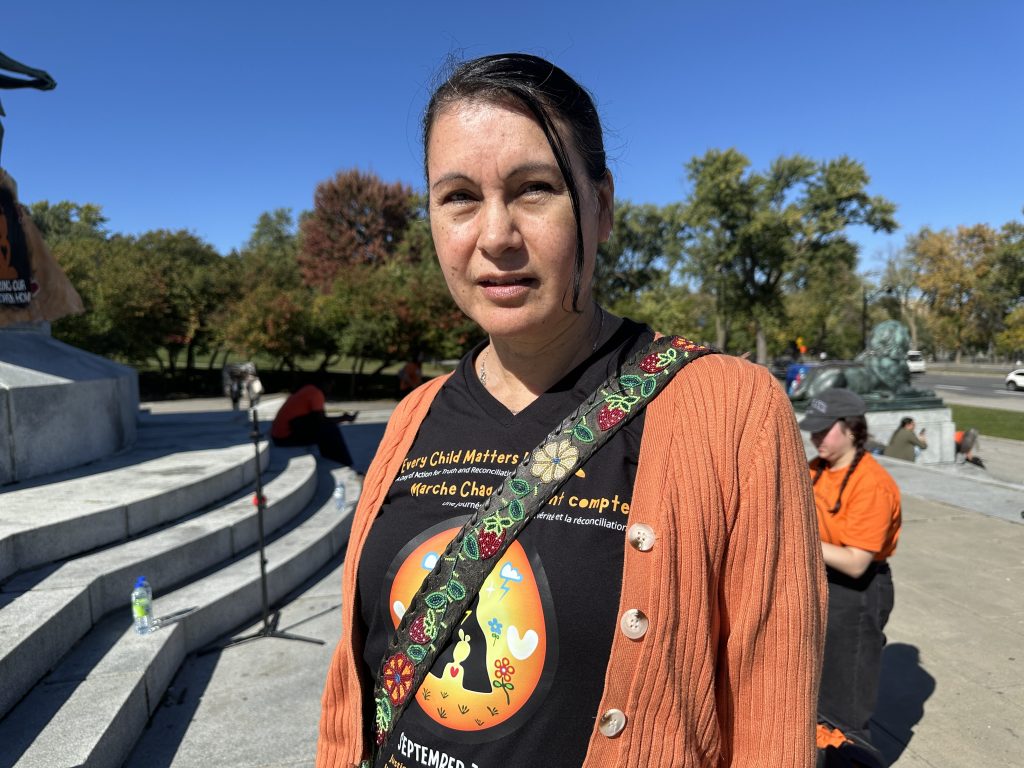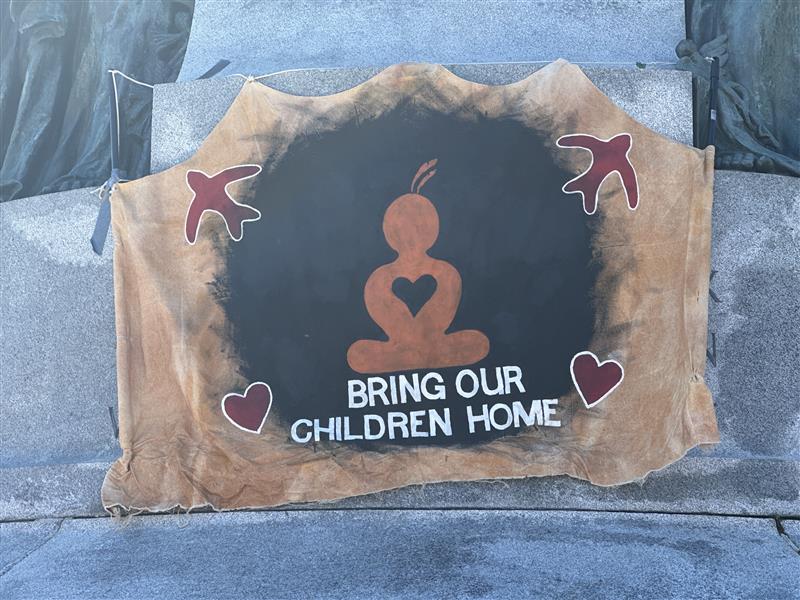The streets of downtown Montreal filled with the sound of drums, chants and footsteps on Tuesday as people gathered for the Every Child Matters march — a powerful demonstration on the National Day for Truth and Reconciliation.
The march began with a pre-ceremony at the George-Étienne Cartier Monument in Parc du Mont-Royal. There, Indigenous voices led songs, shared stories, and called on those present to remember the children who never returned home from Canada’s residential school system.
Participants walked through the city along Parc Ave., Sherbrooke St. and Mansfield St., before ending at Place du Canada. The event marked the fifth year Montreal has formally recognized the day with a public march.
‘It’s a day of remembrance’
The march honours the memory of Indigenous children who were taken from their families and placed in residential schools. These institutions — created by the Canadian government and run largely by churches — aimed to erase Indigenous languages, cultures and identities.
Many children suffered abuse. Many died. Those who survived were forever changed — and generations continue to live with that trauma today.

Na’kuset, executive director of the Native Women’s Shelter of Montreal, said events like this are vital.
“What you find in the history books is like hardly anything,” she said. “I think that for people to come out in large numbers, you know, it shows that you’re with us and then the messages that you hear are like outstanding so that’s better than you know the education system.”
“It’s not like it’s a fun time to be had,” she said. “But I think by coming together it’s a day of remembrance and a day of like showing respect.”

Na’kuset said the ongoing discovery of unmarked graves at former residential school sites shows the legacy of the system is not in the past.
“There’s mass graves, right? Like this is an issue that is still ongoing. They’re still found at certain residential schools. We’re still trying to figure out who is family, who are these children,” she said.
‘The government should be here’
While the federal government recognizes Sept. 30 as a statutory holiday, Quebec does not — a decision Na’kuset and others say sends the wrong message.
“Well they should be here. All of them should be here, right?” she said. “I know that the government right now is in the National Assembly having a meeting with all the other politicians. Why would they do that on September 30th?”
“They should stand with us and they should hear what our survivor has to share, what our elder has to share, the other speakers,” she said.

A symbol taken — and reclaimed
The sea of orange seen throughout the march was not just symbolic — it carried deep personal meaning.
The orange shirt comes from the story of a young girl whose shirt — a gift from her grandmother — was taken from her on her first day at residential school. That small act has become a national symbol of resistance and survival.
“We’re here because of the fact of that resilience that the young girl had towards what she wanted to wear and what she could wear,” said Lance Delisle, MC of the Every Child Matters march. “And also what she stood by, which was wanting to be with her people, wanting to be with her culture.”

Delisle, who is Mohawk and the grandchild of a residential school survivor, said the day is personal for him — and for many.
“It’s important to retell the stories of my grandparents who went through this struggle, who fought hard for my identity, my language and my culture,” he said. “We stand here not only just as survivors, but as storytellers to what our struggle is.”
He said while awareness has grown in recent years, words of sorrow and responsibility still matter.
“I think the first thing is admittance to what the government did to us, the church did to us,” he said. “We’ve brought the awareness, now it’s up to them to bring the final chapter to a close by saying we’re sorry. Sometimes it’s just as simple as that.”

‘The least I could do’
The day also drew first-time attendees like Anthony McCall, who said he came to learn more and show support.
“Sadly, it’s a very dark part of our Canadian history and it’s an important issue,” he said. “So, you know, doing the best I can to kind of just show my support and be involved and just making more people aware of what has happened.”
“Coming here is just the least I could do to help spread the word about this issue.”

‘Sometimes it’s just as simple as that’
As people gathered in reflection and solidarity, organizers said truth-telling must continue — not only from survivors and their families, but also from institutions.
“I think the first thing is admittance to what the government did to us, the church did to us,” Delisle said. “We’ve brought the awareness, now it’s up to them to bring the final chapter to a close by saying we’re sorry.”
“Sometimes it’s just as simple as that.”



